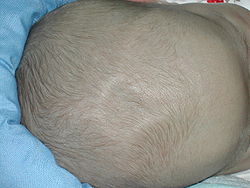
Summary
The anterior fontanelle (bregmatic fontanelle, frontal fontanelle) is the largest fontanelle, and is placed at the junction of the sagittal suture, coronal suture, and frontal suture; it is lozenge-shaped, and measures about 4 cm in its antero-posterior and 2.5 cm in its transverse diameter. The fontanelle allows the skull to deform during birth to ease its passage through the birth canal and for expansion of the brain after birth.
| Anterior fontanelle | |
|---|---|
 Skull at birth, showing frontal and occipital fonticuli. | |
 Human anterior fontanelle 1 month | |
| Details | |
| Identifiers | |
| Latin | fonticulus anterior |
| TA98 | A02.1.00.028 |
| TA2 | 432 |
| FMA | 75439 |
| Anatomical terminology [edit on Wikidata] | |
The anterior fontanelle typically closes between the ages of 12 and 18 months.
Clinical significance edit
The anterior fontanelle is useful clinically. Examination of an infant includes palpating the anterior fontanelle. A sunken fontanelle indicates dehydration whereas a very tense or bulging anterior fontanelle indicates raised intracranial pressure. However, this is not a certain indicator for raised pressure as prolonged crying by the baby may produce the same effect. A full anterior fontanelle may also be indicative of neonatal meningitis, specifically acute bacterial meningitis.
Additional images edit
-
Skull of newborn. Anterior view.
See also edit
External links edit
- Anatomy image: skel/fetal2 at Human Anatomy Lecture (Biology 129), Pennsylvania State University


